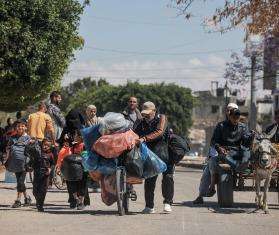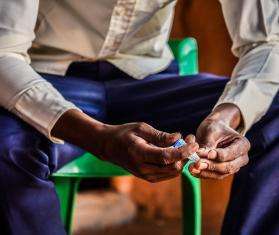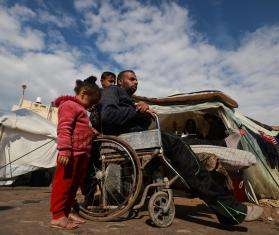Aïssé Ouedraogo arrived at the water point a few kilometers from her home at 4:00 in the morning. Six hours later she had barely filled 10 jerry cans with clean water, each of them carrying just 20 liters [about five gallons]. “I can't take more than that,” she said. “There is not enough water in this region, and if I take more than I need, the others will not have enough.”
At this water point in the district of Gorom Gorom in Burkina Faso’s desert Sahel region, dozens of women like Ouedraogo wait each day for their turn to fill jerry cans with clean water. She arrived here after fleeing violence in her home village of Boulékéssi, about 52 miles away. Since 2018, this region has been at the center of a growing armed conflict that has spread across borders and into neighboring countries. The fighting—coupled with the effects of climate change—has left many people like Ouedraogo without access to safe water and at risk of disease outbreaks.
Six of Burkina Faso’s 13 regions are affected by the water crisis: Sahel, Centre-Nord, Nord, Est, Boucle du Mouhoun, and Centre-Est. Doctors Without Borders/Médecins Sans Frontières (MSF) is responding in four of these to bring water to people in need. In 2020, our teams distributed more than 35 million gallons of water, an amount equivalent to 45 Olympic-sized swimming pools. MSF also provides water and sanitation services, hygiene supplies, and basic health services, but more humanitarian assistance is urgently needed.
A worsening humanitarian crisis
Since 2018, the Sahel region of Burkina Faso has been plagued by violence between various armed groups and the Burkinese armed forces. The fighting has created a serious humanitarian crisis, with large-scale displacement and the arrival of refugees from neighboring Niger and Mali.
More than 350,000 people are currently displaced in the Sahel, around a third of the region's total population, and 628,000 people are in need of assistance for water, hygiene, and sanitation. In both areas with ongoing violence and those hosting thousands of displaced people, access to basic services is a big challenge and the health risks are enormous.
Before the conflict began, the region was already experiencing strong seasonal climatic variations that put pressure on its limited water resources. According to the UN Water, Hygiene, and Sanitation humanitarian sector group, around 92,000 people are in need of assistance in the Gorom Gorom district alone.

Guènèba Hamidou, 49, also arrived at the same water point early in the morning. Also from Boulékéssi, she fled her village in 2019 following deadly attacks.
“Life is not at all easy here,” she said. “Since we arrived to Gorom Gorom, the water problem has worsened. Food and water are insufficient and it is difficult to get them. [On] the days when I go home with empty jerry cans I have nothing to use for cooking.”
Lack of clean water raises the risk of disease outbreaks
Water is more plentiful during the rainy season, which begins in June, but using it for cooking or drinking comes with its own dangers. The lack of clean water and high concentration of people in the region results in the spread of parasitic infections, skin diseases, and water-borne diseases like diarrhea.
"We receive hundreds of patients each month in the health centers that we support because of diseases that are the result of poor water quality," said MSF medical coordinator David Munganga. From January to March 2021, MSF treated more than 1,200 children under the age of five who were suffering from diarrhea in our Dori and Gorom Gorom clinics alone.
In Gorom Gorom district, MSF teams recently built a new borehole to increase access to clean water on a site that serves more than 20,000 displaced people. This borehole can provide 1,100 liters [nearly 300 gallons] of water per hour, and complements seven other boreholes that the teams have repaired in the area.
MSF also supports the Gorom Gorom district hospital and two other health centers. Our teams also distribute hygiene kits including soap, jerry cans, and water disinfection tablets to newly displaced people. And MSF health promoters regularly visit displaced communities to educate and raise awareness about health and hygiene-related issues.
“Access to water and basic services for displaced people and local communities in the Sahel region, and in many places in Burkina Faso, is a real challenge,” said MSF head of mission in Burkina Faso Youssouf Aly Dembélé. "A greater presence of humanitarian organizations is necessary to meet the growing medical and humanitarian needs of a population heavily affected by conflict."
MSF currently provides medical and humanitarian assistance to local communities and displaced people in Burkina Faso. Services include free basic and specialist health care, vaccination campaigns, and the distribution of relief items. In 2020, MSF teams carried out more than 478,000 medical consultations in the country.




